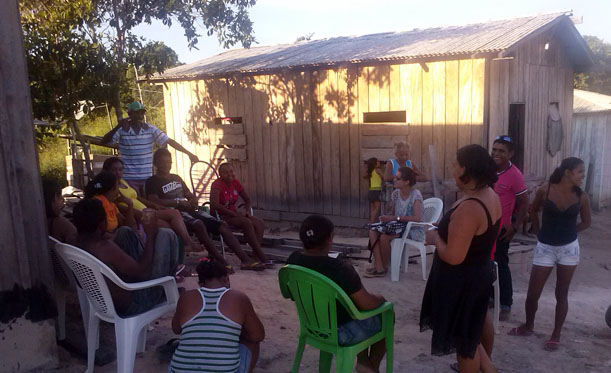Families of Vitória do Xingu struggle for the right for housing
The municipality which hosts Belo Monte, is awarded by nearly 10 millions reais per month, but its benefits are far from those who most need it. Goiano is one of […]
Publicado 20/07/2014
The municipality which hosts Belo Monte, is awarded by nearly 10 millions reais per month, but its benefits are far from those who most need it.
Goiano is one of the first who build its shelter at the occupation Nova Vitória, at the city of Vitória do Xingu, in the countryside of Pará. He lives at this occupation since October of 2012 with more than 1000 families who are also in the struggle for the right of housing. But it have not been the first time he have been to this area: In 2008, Goiano, and more 33 workers were enslaved and were rescued from the place, the area was a property of Danilo Dâmaso, know as Laticínio.
The neighbourhood named Nova Vitória is formed by two occupations: one of this areas is of Laticínio and the other is a plot which belongs to the city hall. The occupation is one of the first views when entering the municipality of Vitória do Xingu by the the highway PA-415, one at the right side and one at the lest side of the main avenue. Who comes to this small city of 15 thousand inhabitants and sees the humble houses in the middle of the dust does not imagine that this city hosts the head quarter of the Belo Monte dam. Where is destined the mayor part of the taxes of the construction?

Meeting of the inhabitants of Nova Vitória
Meanwhile Altamira is chaotic due to the boom at its number of inhabitants and the flooding caused by the construction of the dam. The neighbour city Vitória do Xingu receives nearly 91,65% of all the Service Taxes (ISS) paid by the construction of the dam, because nearly all construction areas is localized at that municipality. This means a total of R$ 635 millions during the whole construction, which means circa of 5 to 10 million reais per month, depending of the speed of the construction. To make a comparison the municipality’s annual income is 16, 6 millions reais, which of 15,9 millions are federal resources.
The population are not seeing where all this money is going to. What the population sees that the city transformed in a huge construction site, of questionable quality and appearing to lack planning.
Margarida, for example, was happy because her street was going to be paved. Soon she was disappointed with the result. She asked the worker at the time, Is it already finished, that’s all? He answered, Ms., we received order to tar the road only.
For the inhabitants of the Nova Vitória occupation, no benefit at all: there is no water service, energy, nor garbage collection or school transport for the children. They are invisible to the eyes of the public services because they are at irregular area. Its ironic to say about irregularity, since the municipality have lived a scandal involving even the previous mayor Liberalino Neto sun of Danilo Dâmaso, the same owner of the laticínio area.
And now, a law project will put the occupations at risk: the law of land title of the city presses the regularization of occupied plots only to those which belongs to the state and is more than five years under occupation (The Nova Vitória occupation has less than three years). Besides this, presses the regularization only by buying the land at market price. This is going back to the 19th century, at the time of the ‘Laws of Land Property – which does not guarantees the right to housing, affirms the public defender Andréia Barreto.
This law project entered at the agenda of the municipal chamber to be voted at the end of June, but the presence of the inhabitants of the occupation at the sessions have generated a certain discomfort. The municipal chamber entered in vacations and the project have not been voted. While, waited for the sessions, some of the aldermen and assessors went to speak to some of the inhabitants of the occupation and wanted to tranquillize them this law has nothing to do with you, no one are going to take you out from there. But the families have understood that to guarantee the right to housing words are not enough.

